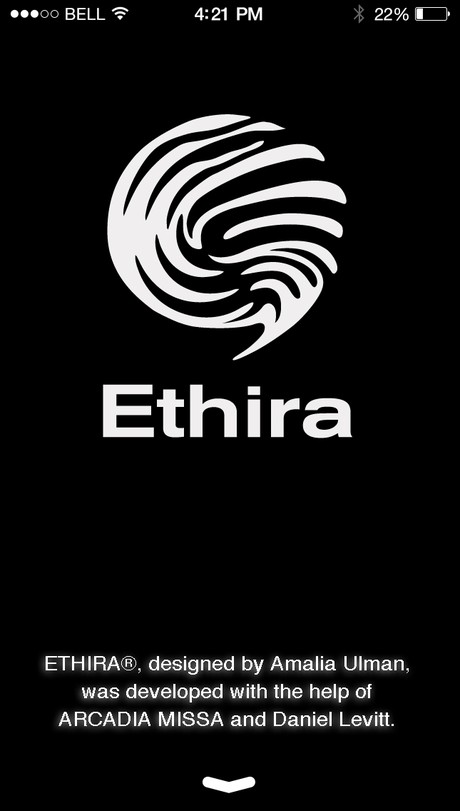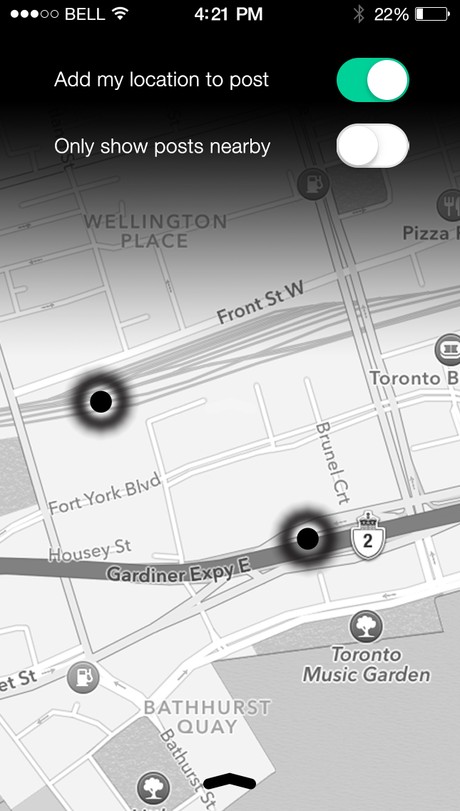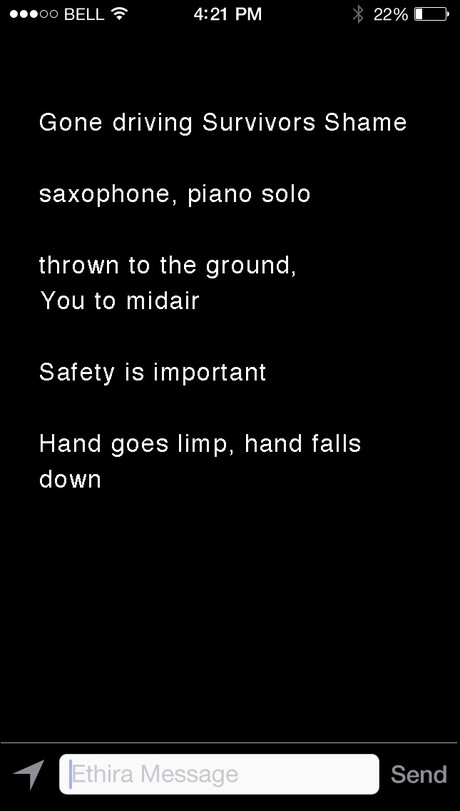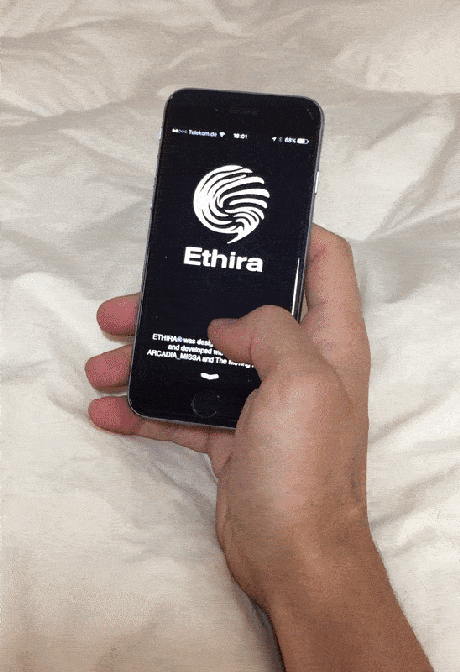This article accompanies the inclusion of Amalia Ulman's Ethira(2013) in the online exhibition Net Art Anthology. Image: Amalia Ulman, Ethira website, 2013
Michael Connor: How did you come to this idea of making an app as part of your artistic practice?
Amalia Ulman: I didn’t think about the app on those terms, I simply wanted the app to exist so I, and those with similar needs, could use it. It was 2013, and even though the term selfie hadn’t been adopted by the mainstream and there weren’t a thousand think pieces about social media yet, art under capitalism rewarded those who could become entities with recognizable aesthetics, classifiable patterns of behaviour, who could brand themselves in a fashion easy to pin down, with a solid identity. Those who could be both influencers and artists.
In the midst of it all, I just wanted to not be. I wanted to challenge those expectations, to fluctuate between identities, step away from labels set on stone. Metamorphosis became apparent in Excellences & Perfections and then Privilege. Disappearance on the other hand, took place in Ethira.

Twitter seemed the go-to app for those with mental health issues, especially depression, as a form of release. The problem with that though, is that Twitter functions on the same accumulative way as other social media platforms, your problems become inseparable from your handle and your issues the only reason for your followers to like your tweets. It is a vicious circle where any impulse toward well-being suddenly turns counterproductive.
I wasn’t happy with that structure of archived confessions, I always thought that as long posts were archived, quantified and graded through likes and retweets, words would calcify and turn heavy. I wanted these thoughts to be released into the internet, yes, but I also wanted them to disappear and never come back -instead of being transformed into cultural capital.
Ethira had no archive. Your post would erase itself and the platform wouldn't keep track of anything. It was like screaming into a void, and having that feeling of relief afterwards.
MC: So you could post a message, and it would be anonymous, and disappear after a certain time?
AU: It would disappear before your eyes, like water evaporating on a hot stone.
MC: Would anyone else see it?
AU: Yes, anyone. In the main page, you could see what people were posting. They appeared in the same order they were typed. Ideally a mess of different alphabets and languages from all over the world would show up. Then, if you wanted to reduce the scope of what you were looking at, you could turn the map on and see what's been posted near you.

MC: The location part of it was added in the second version, which was released a bit later?
AU: Yes, and you could decide if you wanted your location to show up underneath your message or not. But I really liked the idea that there was a chance of actually meeting somebody through the app, like in an old message board.
I know it sounds nostalgic but I really miss that kind of anonymity online. I also find communication more attractive when the channels for doing so are challenging... I find TMI boring.
MC: When you exhibited the work in 2013, at Arcadia Missa, the press release announces that there were contributions from a number of different artists and writers. What form did those take?
AU: The app had just been released, so I wanted to showcase it by using examples. I invited those whose twitter I enjoyed, like Gerardo Contreras from Preteen Gallery or artists with a writing practice.
We actually had to do two presentations, one in 2013 and one in 2014. It was in 2014 that I managed to get more funding to finally get a better graphic design (by Krzysztof Pyda), a new website and to re-develop the app to get rid of bugs. From the very beginning I envisioned the app to be done professionally and in a detached manner, but the process ended up being dirtier, more DIY due to the lack of institutional support. That’s why It took so long to make and took so many attempts to finally do it.
MC: And how did you get it built without that support?
AU: Well, Arcadia Missa helped me the most during the first attempt. But it mostly happened through favors from people we knew who were developers.
But I truly resent how long the process was, I actually started working on it in 2012. I was always sad that it couldn’t be released before, when nothing like it existed. It was frustrating to lose momentum.
If I had had the additional funding it would have been coded correctly from the get go, with more international support, people downloading the app in larger numbers…
MC: Did the people who helped you expect that it would be commercially successful?
AU: The app was anti-capitalist in its core, so it was never meant to be commercially successful. There would never be any revenue from advertisement or from data licensing, as nothing was measured.
It is hard selling an idea when its main characteristic is its immateriality.
I always expected the app to be boosted by initial funding (from a museum for example) and then die.
MC: Can you talk about who began to use and what it was like when it started to circulate in the world? Was it mainly through the gallery exhibition or what kind of life did it have as an app?
AU: It had more life when we received the help of the Moving Museum and galleries from different countries, which did their own presentations and invited locals. But it never left the realm of the art world. The app looked forward to be used by sad teenagers but I don’t know if it ever happened. But maybe it did while I wasn’t watching. Who knows, that was the beauty of the app.
I had very romantic ideas for the app, a vision that I shared with other introverts. But it could have had many other uses, of course. Once a professional scammer told me the app was exciting because it couldn’t “tapped” and could be use to arrange meetings in undisclosed locations.
What I had in mind for depressed adolescents might have become a platform for terrorists.
MC: You said that people were using it for mental health reasons.
AU: A close friend of mine told me “I wish Ethira had happened, if she had been able to use it, it would have helped her” referring to a friend who had taken her life.
Regular social media exerts a lot of pressure and takes a toll on mental health. Not only because one is always being held accountable for every word, but also because awaiting the feedback of likes and retweets generates anxiety. If your tweets disappeared though, you’d have no reactions to wait for.


MC: So, what brought about the demise of Ethira?
AU: In between the two releases of Ethira, I got into an accident that turned my life upside down. I had to learn to walk again while attending to all the obligations that had been set before the crash. Talks for 89+, solo shows at galleries etc. It was a very hard time. I had no home before, as I was young and always traveling between shows in different countries, so later, disabled, I had to crash at someone else’s home, becoming a bleeding burden in Los Angeles.
Due to my lack of power, new disability and the painkillers I had to take, I politely stayed quiet and silently worked on Excellences & Perfections and Ethira 2.0.
It was during this time, at one dinner meeting I attended with my then-housemates, I had to listen to one of them presenting his app to a rich collector, an app which sounded ridiculously similar to Ethira.
Whenever I brought it up, it was said to me that I was crazy, egocentric. It had nothing to do with me, that it was completely different. That I was delusional.Even though I knew it wasn’t true, I couldn’t fight back. On oxycodone and in excruciating pain, I wasn’t sure of myself anymore. Also, he had managed to get funding from a millionaire at DLD, get covered by Wired magazine…
So basically when version 2.0 of Ethira came out, I had already given up, but I wanted to give it a decent demise, with a nice looking design and more recognition.
MC: How long were you working on it?
AU: Since 2012 till the end of 2014.
MC: So this person that took the app was taking your idea–which was meant to be unmarketable and non-profitable–and trying to do it as a business, right?
AU: Yes, that’s the only thing that helped me keep a sense of humor… I knew he would fail. It was the stupidest idea to try to make the app profitable. Also, by the time he stole it, platforms like Whisper already existed.
It was only a few months ago that one of the developers reached out to me to apologise. He told me that at some point my housemate/“ceo” had confessed he had taken the idea from me. The developer was really sorry, and said he had tried to take the app from him to give it to me, but that unfortunately the “ceo” had gotten sued by his own investor and it was all very tricky…
But by the time I got this message I didn’t really care anymore… although it was hard coming to terms with the fact that everyone knew and I had been gaslighted.
MC: The developer knew that it was taken directly from your project?
AU: Yes, but he only knew at the very end. He barely knew me when he originally worked on the app. Maybe it would had been different now, if I had been stronger I could have done my research, talked to the developers, etc. But at the time I was too weak.
MC: Having been through this experience, what do you think about the idea of artist-made platforms or tools for communication? Does it still seem like an urgent area of practice? You mentioned that there are other things that have filled that gap, but looking back, do you see possibilities in the tradition of what you were doing, or does that appear to be closed off now?
AU: I don’t see urgency in something that’s inherent to human nature like communication, but I’m particularly interested in language because I’m bad at it (I have difficulties, especially when it comes to verbalise my thoughts through speech) and because I speak two tongues English and Spanish, which makes my brain juggle between imaginary dictionaries all the time.
I’ve always paid attention to how people communicate due to my lack of skills but recently I’ve become fascinated by linguistics because I started learning languages with different alphabets–so far, Mandarin and Russian. I like how different accents, sounds and grammar help to understand different nations and their philosophy, also how different languages can alter facial features through the use or misuse of certain muscles.
There are so many words and expressions that cannot be translated to English and vice versa… I really like that. I think misunderstandings are inevitable and valuable. Everyone is obsessed with the bridging of cultures and understanding (which generally means westernizing everything) but I personally think that respecting misunderstandings is better.
All of this is reflected in my practice. I'm not particularly interested in apps or the mix between art and technology. Sometimes my works requires new media but some other times a piece of wire or a live pigeon, like Bob. Whatever makes sense to me, I use. For example now I'm working on a feature film and a book.

MC: Going back to artists working in technology, you had an extremely negative experience - possibly even a cautionary tale - as an artist trying to engage with technology.
AU: It depends. If you are an educated blue-eyed white guy from Somerset England, you will probably do fine with the discourse utilized in those circles. If you are from an oppressed minority it might be hard to keep a smile and engage with the people who inflict direct harm on your families and communities.
In my particular case, it’d be hard to attend a forum where a panel discussion might include someone from Bayer while I know Monsanto’s fumigations of transgenic soya in rural northern Argentina are making some of my relatives go blind, the rest of the population die from cancer at alarming rates, and babies be born with lethal deformities.
Many artists talk the talk required by that system, are comfortable when in the midst of that kind of power–because they crave it or because they already have it and feel completely at ease with it.
That being said, not all technology, science, and medicine belong in this bubble, but I fear it is harder to keep your research afloat when you are trying to fight a monster with global dimensions and you are constantly being pushed down.
My life has been affected negatively by those using the authority of legal, corporate speech, and medical jargon. So how could I possibly believe in it? How could I possibly reinforce the immunity and power of these entities?
MC: When you said you had an issue with the discourse of technology, I thought you meant almost like an aesthetic disagreement, but your issue is really about the way the language is an instrument of power.
AU: I find it to be a very uniform language which happens to be also a very western and gendered one. I find it problematic that for one to be taken seriously one has to surrender to it.
MC: Have you ever made work about this kind of language?
AU: Yes, I mostly like twisting it, like in The Future Ahead - Improvements for the further masculinization of prepubescent boys. I’m extremely familiar with medical jargon because I don’t fully trust the doctors I can afford in the USA, especially when it comes to prescription drugs. So I read a lot of medical papers and spend hours looking at forums where people talk about their symptoms and compare results. This is especially important for conditions that are taken lightly by the medical establishment.
MC: And in spite of all of this, you managed to give the app a decent demise.. You can’t use it in any way, right?
AU: Yeah, Ethira is dead. Rest in Peace Ethira. She was written in water over hot stone and disappeared.
